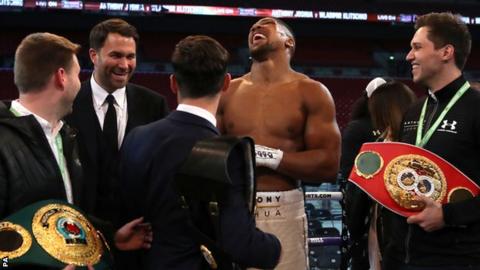"Anthony Joshua's win over Wladimir Klitschko makes him part of mainstream"
So that was the night when a talented young sportsman supersized to become part of mainstream British culture.
Nothing will ever again be the same for Anthony Joshua, a prodigiously gifted boxer who in 11 rounds of twisting drama escaped not only the fists of Wladimir Klitschko and the dislocated senses that came from them but the tight boundaries of his chosen sport.
These moments come along infrequently but unforgettably, sometimes through great triumph, sometimes through desperate failure: a performer long appreciated in their own world who through one act or display jumps the barriers into an altogether greater sphere of fame.Barry McGuigan overcoming Eusebio Pedroza at Loftus Road in 1985, Paul Gascoigne being yellow-carded in Turin in 1990. Bradley Wiggins and some yellow of his own on the Champs-Elysees before a throne at Hampton Court a few weeks later. Dennis Taylor and a black-ball finger waggle; Mo Farah and a Stratford Saturday night Mobot, Jonny Wilkinson and a late drop-goal on the other side of the world.
It doesn't matter if nothing else they do ever quite matches that initial impact. Into the national consciousness they have been stamped, from playgrounds to offices, dinner parties to dinner ladies, front pages to social media memes.
Joshua's coming of age was not witnessed by 18 million people on terrestrial television like Taylor's, nor was it part of a wider festival of surreal national success like Wiggins and Farah. Its impression instead comes both from what was expected and what actually transpired, from the way it was achieved, from the distinctive emotions boxing can still illustrate and stir.
This was a heavyweight title fight that appeared predictable - the short game for Joshua, the long one for Klitschko - and behaved any way but: the 41-year-old veteran initially resurgent and fluid, the young puncher putting his man down and then being stunned himself with celebrations still rolling round the arena. A cruel, lost period when Joshua somehow held on in the darkness, the slow assertion of tactical superiority by the old stager and then, from nowhere, the final shattering denouement, an uppercut to be felt around the nation, an explosion of blows and stumbling feet and raised arms.
It was boxing with the plot twists of Test cricket, turning with the speed of the critical holes of a Ryder Cup Sunday, a callow kid becoming a true champion in 11 rounds that felt simultaneously far longer and a breathless fast-forward that pushed everything else away.
There is no hiding place for pain and pleasure in boxing, no mask to disguise what a boxer is going through when his opponent's arsenal detonates. When the skin around Klitschko's left eye was opened up by Joshua's right hand early in the fifth, the shock was as visible as the Ukrainian's blood; when Joshua was nailed with a right cross early in the sixth, his legs gave in even as he tried to smile it away, his arms groping for the ropes and missing, his knees trying to straighten but failing.
It spells it out for those watching and it sucks them in. "Boxing is about character - there is nowhere to hide," Joshua would say afterwards, and in the manner that he came through the rest of that sixth round and clung on for the next two, he gave testimony to where the hype ended and heart began.


Comments